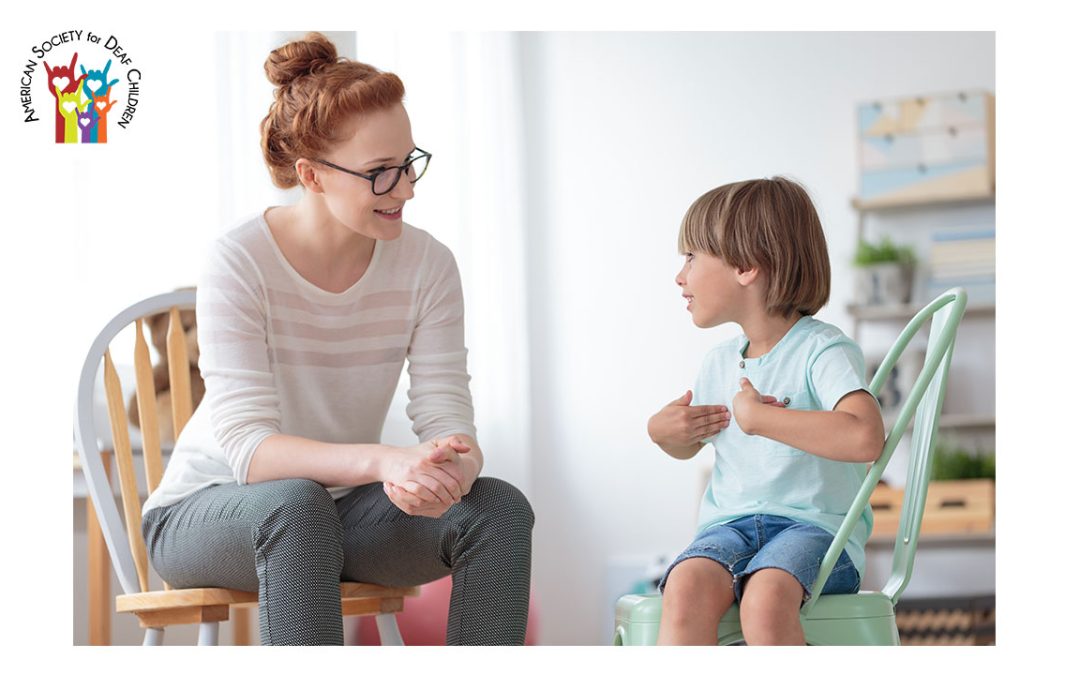fThe Toolkit for Deaf Mental Wellness: A Letter to Parents
by Emma Hunt
Senior Coordinator, Task Forces
Strategic Task Force Group,
National Alliance on Mental Illness
Experiencing Loss
Caring for mental health does not look the same for everyone. When you factor in access to communication and language, or lack thereof, this intricate topic is only further complicated. Typically, a parent’s love is not contingent on their child’s ability to hear. Nevertheless, when a parent finds out that their child has a hearing loss, whether congenital or occurring later in life, this is often conveyed as upsetting news. Unfortunately, most professionals, including audiologists, primary care physicians, and clinicians inadvertently perpetuate this feeling of loss by painting a dire outlook with limited options. Yet, through the lens of many in the Deaf community, quite the opposite is true.
A Different Perspective
Those unaware of Deaf culture, a hearing majority, are easily obscured from access to a cultural community due to the perception that hearing loss leaves the individual wholly at a loss. With the best of intentions, parents are steadfast in helping the child become as hearing as possible. But when the language and communication needs of a child are appropriately assessed, determined, and developed, the ability to hear and speak English can become suboptimal, and can be unachievable for some people. Trying to attain the latter poses a barrier to quality communication access.
Effective mental health support for a deaf or hard of hearing child has often been deemed dependent on integration into the hearing world. Instead, I encourage a shift toward achieving full language and communication access using sign language.
Role of Parents
Parents serve as powerful sources of support, and have the potential to be the greatest mental health advocates for their deaf or hard of hearing children. So how can this be achieved?
The first step towards fulfilling this role is by seeking out professionals who are fluent in ASL and culturally competent in working with children who use ASL. Taking this step demonstrates respect for each child’s unique learning and communication strengths, aptitude, and abilities. This will help them build resilience to overcome challenges that will likely be encountered later in life.
Focus on Communication
As parents, you boost potential for a bright future by equipping your children with the tools needed to share their stories, experiences, intellect and aspirations. By learning sign language yourself, you will safeguard their ability to communicate and therefore view you as a trusted adult when they need to ask for help. You will better structure their building of relationships with others and facilitate the fostering of a support system when times get rough. Overall, you will improve your child’s emotion regulation by supporting their linguistic foundation.
Seek Support
Both parent and child are on this challenging journey, and should not be expected to weather it alone. I also encourage parents to seek out their own mental health education and support. Build a storehouse of resources and secondhand knowledge to assist in your child’s interaction with peers and others. This will help them mold a safe, comfortable space for expression. Systemic barriers imposed by a hearing world can make it difficult to find readily-available support. When parents fill in these gaps themselves, their deaf or hard of hearing children will live by this precedent to create educational, recreational, professional and organizational environments that are built to accommodate their paths toward success.
Embrace Sign Language
Instead of aspiring to make your child as functionally hearing as possible, work to rebuild systems that facilitate sign language. As dedicated parents and family members, you all have the ability to establish expectations for change. This is because success does not hinge on the ability to hear. Moving forward on this journey of learning about the wonderful world of sign language and Deaf culture, I encourage you to stay in tune with what works and what does not.
Communication is a crucial backbone of mental wellness. The lack of ability to communicate, and communicate effectively, is isolating. Parents can impact their child’s mental health, beginning at birth, by advocating for their language and communication needs, and overall right to self-expression.
Mental Health Resources for Deaf Children
“Mental Health Care of Deaf People: A Culturally Affirmative Approach” book by Neil Glickman and Sanjay Gulati
DeafYes! Center for Deaf Empowerment and Recovery
Deaf Wellness Center – University of Rochester Medical Center
Alabama Department of Mental Health – Office of Deaf Services (this agency embraces a culturally affirmative approach)



